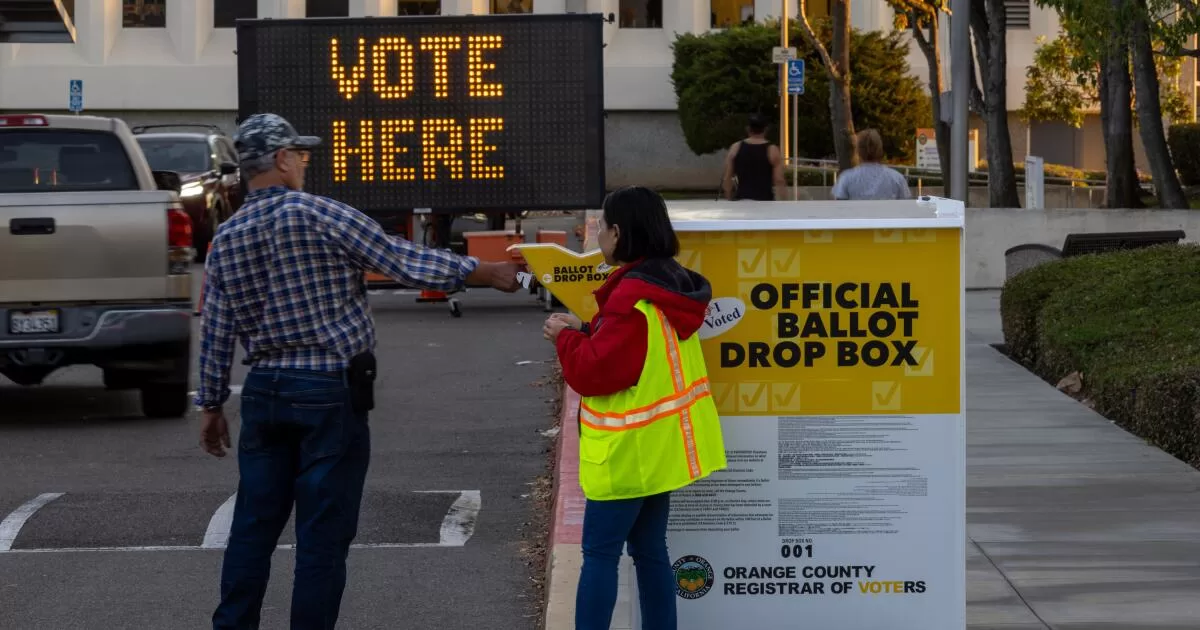In the days leading up to last week’s election, signs posted around Santa Ana showed a community divided over whether residents who are not citizens should be allowed to vote in local races.
“Strengthen Our Democracy,” read lawn signs, in English and Spanish, supporting Measure DD.
“Defend citizen’s rights,” said opposition banners hanging on fences throughout the city.
Casting his vote at the Orange County Registrar of Voters, Juan Molina said that although he has no prejudice against undocumented people, he believes voting rights should be reserved for citizens.
“It has to be a U.S. citizen. We all go through steps to become a U.S. citizen,” said Molina, 61.
That perspective won out in the end, with 60% of voters rejecting the measure that would have been the first in Southern California to give voting rights to noncitizens.
Santa Ana — which had more votes for Vice President Kamala Harris than President-elect Donald Trump — is a predominately Latino community of about 310,000 people. But experts say the votes against measure DD may indicate that voters, especially Latino voters, are shifting their attitudes about immigration.
“This is kind of in line with trends we’ve been seeing in both polling and elections of the Latino community getting more conservative on issues of immigration,” said Jon Gould, Dean of the School of Social Ecology at UC Irvine.
It may also reflect how naturalized voters view citizenship, an often years-long and expensive lawful status to obtain.
“Nationally, there’s this growing sense that citizenship matters. It’s a process that needs to be respected,” said Mike Madrid, a Republican political consultant with expertise in Latino voting trends.
Measure DD also arrived on the ballot during an election season heavy on anti-immigrant rhetoric as the GOP castigated the Biden-Harris administration for unlawful border crossings. Trump and other Republicans spread misinformation about noncitizens illegally voting in federal elections to skew results in favor of Democrats — despite laws and decades of studies that dispute claims of voter fraud.
Republicans introduced legislation in Congress this year that would have required states to obtain proof of U.S. citizenship when people register to vote. It was not successful, but several GOP-controlled states put similar measures on the ballot that won. Voters approved measures last week in Idaho, Iowa, Kentucky, Missouri, North Carolina, Oklahoma, South Carolina and Wisconsin to explicitly ban noncitizens from voting in state and local elections.
Federal law already bans noncitizens from voting in presidential elections, and those who commit voter fraud may face imprisonment or deportation.
However, federal law allows states to set their own local and statewide election rules, which could include allowing noncitizens to vote in limited local elections, like school board or city council races. And two cities in Northern California are among several nationwide that already allow noncitizens to vote in some local elections.
San Francisco passed Proposition N in 2016 to allow noncitizens with children under 18 years old to vote in school board elections. Prop N passed after two other similar measures were rejected in 2004 and 2010.
Oakland also approved a measure in 2022 that allows noncitizens to vote in school board elections, but the law has not yet been enacted.
Both measures faced legal challenges from a conservative legal group, who dropped the fight after the 1st District Court of Appeals ruled last August that the laws did not violate the California Constitution.
Measure DD would have amended the Santa Ana City Charter to allow noncitizen voting by the November 2028 general municipal election for city council positions.
The measure faced steep opposition from local officials and conservative groups such as Policy Issues Institute, who claimed it would be costly and litigious, and upend citizen’s rights.
Carlos Perea, an immigrant rights advocate who supported the measure, said those groups “hit the panic button.” The results, Perea added, reflect Trump’s influence in a year when the former president campaigned heavily against illegal immigration.
“In the backdrop, we had this growing anti-immigrant, nativist, fascist rhetoric rising in the country,” said Perea, the executive director of the Harbor Institute for Immigrant and Economic Justice.
The campaign for the measure, which defined noncitizens as tax-paying undocumented people and green card holders, said it would allow for fairer elections, evoking the centuries-old slogan “no taxation without representation.”
Perea said he was proud of the work he and other activists, including Latino and Vietnamese advocacy groups, pulled together to put the measure on the ballot. He noted they would keep trying to pass the measure in future elections — pointing to San Francisco’s Prop N as an example.
“We are ready to introduce this again in the near future,” Perea said.
